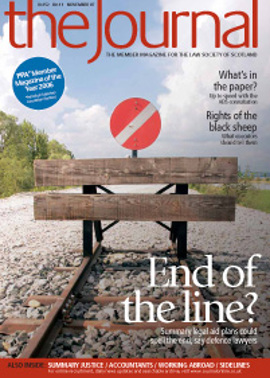Now it's your turn

After several months of labour, the Law Society of Scotland has published its promised discussion paper on options for the introduction of alternative business structures (ABS).
The paper, “The Public Interest – Delivering Scottish Legal Services”, is being sent to all Scottish solicitors as well as many interested groups outside the profession. Its declared purpose is to enable the Society’s Council to be informed of views in all quarters as to the best way forward, when it formulates its proposals for change early next year – proposals which in turn will inform the Scottish Government’s own policy, on which an initial announcement has been promised to the Office of Fair Trading in December.
“This consultation is about having the opportunity to plan for the future: looking at the future needs of those who need to use legal services and also how law firms see themselves developing to meet those demands”, the Society’s President, Richard Henderson, told the Journal. “The more responses we have, the better informed the Council will be when it puts forward proposals to the government in the spring.”
Accessible style
The paper sets out at Council’s request to avoid technical language so far as possible, keeping its non-lawyer readers in mind. It opens by providing by way of background some facts and figures regarding the market for legal services in Scotland, and the approach to reform being taken in England & Wales. For those interested, a series of appendices records the Community law background, the 2004 Research Working Group’s recommendations and the Society’s position at that time, and the current legal framework and what amendments would be necessary for new structures to be permitted.“The key issue”, the introduction states, “is to balance consumer choice and the need for legal firms to compete nationally and internationally with continued access to justice, continued access to good quality legal services and the upholding of the core values of the solicitors’ profession.” And although the Society has not gone so far as to propose any particular regulatory rules or structures that might govern the various business models, it clearly sees itself as the continuing regulator for all forms of practice, at least where solicitors have the majority ownership and control.
Why change?
Echoing the Justice Secretary, Kenny MacAskill, at the Society’s recent conference on ABS, the paper affirms Council’s belief that “no change” is not an acceptable option. It recognises the pressures for change both from within the profession and from wider consumer interests, and the implications for the marketplace of the passing of the Legal Services Act for England & Wales. At the same time it calls on government to undertake a regulatory impact assessment before any change is enacted, “especially as to how changes will affect legal aid, family law, welfare law and consumer protection law”.To those solicitors, especially in smaller firms, not yet convinced of the need for reform, Richard Henderson responds: “There are those who might say ‘It ain’t broke so don’t fix it’, but the increasingly rapid change within the legal sector means that we have to grasp this issue now to ensure that the legal profession can continue to provide the best legal services possible for both the public and Scottish business. The legal profession is constantly changing and adapting – its very success has, in a large part, been due to its ability to respond to changing client demands.”
Access to justice, the need for regulation and the core professional values are headlined as the fundamental principles to keep in mind when considering changes to the current structures. It would be fair to say that the paper does its best to flag up the implications for these cornerstones of the profession as the various options are set out, and consultees are explicitly asked to address them in explaining their preferences.
Legal disciplinary partnerships (LDPs)
Turning to the four possible models for reform, legal disciplinary partnerships (which will be introduced in England ahead of the main reforms under the Legal Services Act) would allow solicitors, advocates and registered foreign lawyers to practise as partners in the same firm. The paper recognises that although an apparently straightforward issue, it raises important questions of principle; and observes that the growth of the solicitor advocate sector together with fewer restrictions on moving between the solicitor and advocate branches of the profession may make restrictions easier to justify.
Under this topic the questions posed are whether the legal services market would benefit from the LDP model; whether there is a justification for requiring clients to instruct solicitors if they wish to instruct an advocate for a court appearance; and whether consumer choice is adequately provided by the choice between advocates and solicitor advocates.
Multidisciplinary partnerships (MDPs)
The consultation notes that this model contains a number of permutations – LDPs, partnerships with members of other regulated professions, partnerships with other individuals – and a corresponding variety in services offered. While some firms already offer a range of cross-discipline services, this option would allow non-solicitors to become full equity partners.
The Council believes that the Society should remain the regulator for such practices. Setting out the competing considerations, economic and professional, the paper states: “The Society recognises that there could well be economic advantages in MDPs although it is concerned that the concept might not be wholly compatible with the core values of the profession. However, if means could be devised to establish MDPs without compromising those protections, the Society has indicated that it would be more in favour of MDPs.”
Respondents’ views are sought on several matters including whether MDPs would be an adequate response to the demands for change, the effect on the core values of the profession, the impact on the Guarantee Fund and Master Policy, the effect on access to justice, and resolving conflict between regulatory codes.
Shareholding option
To be distinguished from the external ownership model, this option would allow non-solicitors to hold shares in an incorporated practice, but not to become directors. It could achieve greater incentives for non-solicitor members of staff, and greater flexibility in arrangements for retiring partners, as well as allowing larger firms some access to external capital. However it raises issues of control of a practice, “fitness to own”, potential conflict between shareholder and client interests, and resource implications for the Society.
The paper’s questions relate to possible rules to ensure that control of a practice is not circumvented, “fitness to own” criteria, and levies by the Society.
Non-lawyer ownership and control
This is the “Tesco law” model – the one that would allow non-solicitors to own and control legal practices, and the model due to arrive in England & Wales around 2011 on current forecasts. In addition to the as yet undefined “fitness to own” criteria, the paper observes: “There are significant issues in relation to client confidentiality, legal professional privilege, client protections and complaints handling which are as yet unresolved.” It also notes that this model could in effect be achieved by abolishing the reserved areas, allowing any type of business to provide any legal services provided it did not trade as “solicitors”.
Here the key questions are whether the legal services market would benefit from this model; how to ensure that the solicitors’ code of conduct takes priority over shareholders’ interests; whether the abolition of the reserved areas would provide the level of competition demanded by consumers while retaining the integrity of the profession; and whether legal professional privilege should be available to customers of practices not owned and operated by solicitors.
President’s call to all
Concluding with an invitation to comment on any areas that respondents think have not been covered, the consultation also poses two general questions: what requirements, if any, should be in place to protect solicitors’ independence; and whether it would be advantageous to make a phased introduction of ABS.
Calling for all solicitors to submit their views, the President added: “The consultation gives us the means to hear the views of the profession and other stakeholders directly and we are looking for as much and as wide-ranging feedback as possible. We want respondents to let us know what their preferred models are and why, and also to consider opportunities and threats that each of the different models proposed might present – and what they think the solutions to any threats might be.
“We will continue to promote the issues surrounding alternative business structures throughout the period of consultation, to ensure not only that our members can be fully engaged in the debate about their future, but that all of civic Scotland can contribute to one of the biggest issues facing the legal profession and all those that it serves.”
HOW TO RESPOND
The consultation can be viewed online via the link on the Society’s home page www.lawscot.org.uk . Responses, marked “ABS Consultation”, can be emailed to ABSConsultation@lawscot.org.uk, faxed to 0131 225 4243 or posted to The Law Society of Scotland, 26 Drumsheugh Gardens, Edinburgh EH3 7YR; LP 1 Edinburgh – 1.
Deadline is 31 January 2008.
In this issue
- The shape of your future
- The law and the forum
- End of the line?
- Summary justice: the big picture
- Now it's your turn
- Flying south
- Legal rights and the black sheep
- Mediation innovation
- Counting on your CA
- The risk of paper cuts
- Society hits the Net at Murrayfield
- Leading the charge
- Computer says no
- Who, what, where, when, why?
- Getting in on the Act
- Scottish Solicitors' Discipline Tribunal
- Website reviews
- Book reviews
- Well funded work
- PSG offers an offer






